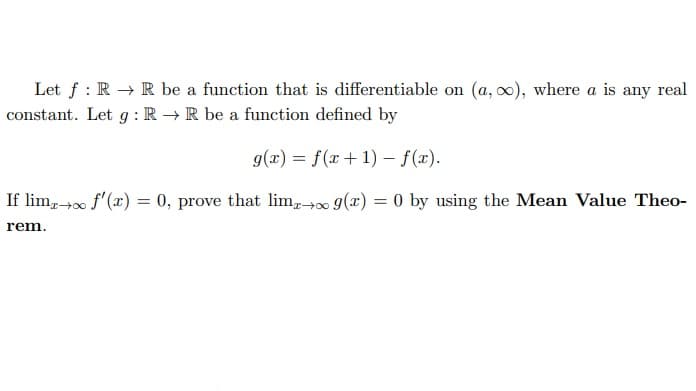Let f: RR be a function that is differentiable on (a, o), where a is any real constant. Let g: RR be a function defined by g(x) = f(x+1)-f(x). If limx→∞ f'(x) = 0, prove that limx→ 9(x) = 0 by using the Mean Value Theo- rem.
Let f: RR be a function that is differentiable on (a, o), where a is any real constant. Let g: RR be a function defined by g(x) = f(x+1)-f(x). If limx→∞ f'(x) = 0, prove that limx→ 9(x) = 0 by using the Mean Value Theo- rem.
Chapter3: Functions
Section3.3: Rates Of Change And Behavior Of Graphs
Problem 2SE: If a functionfis increasing on (a,b) and decreasing on (b,c) , then what can be said about the local...
Related questions
Question

Transcribed Image Text:Let f: RR be a function that is differentiable on (a, o), where a is any real
constant. Let g: RR be a function defined by
g(x) = f(x + 1) - f(x).
If limx→∞ f'(x) = 0, prove that limo g(x) = 0 by using the Mean Value Theo-
rem.
Expert Solution
This question has been solved!
Explore an expertly crafted, step-by-step solution for a thorough understanding of key concepts.
Step by step
Solved in 2 steps with 2 images

Recommended textbooks for you


College Algebra (MindTap Course List)
Algebra
ISBN:
9781305652231
Author:
R. David Gustafson, Jeff Hughes
Publisher:
Cengage Learning


College Algebra (MindTap Course List)
Algebra
ISBN:
9781305652231
Author:
R. David Gustafson, Jeff Hughes
Publisher:
Cengage Learning